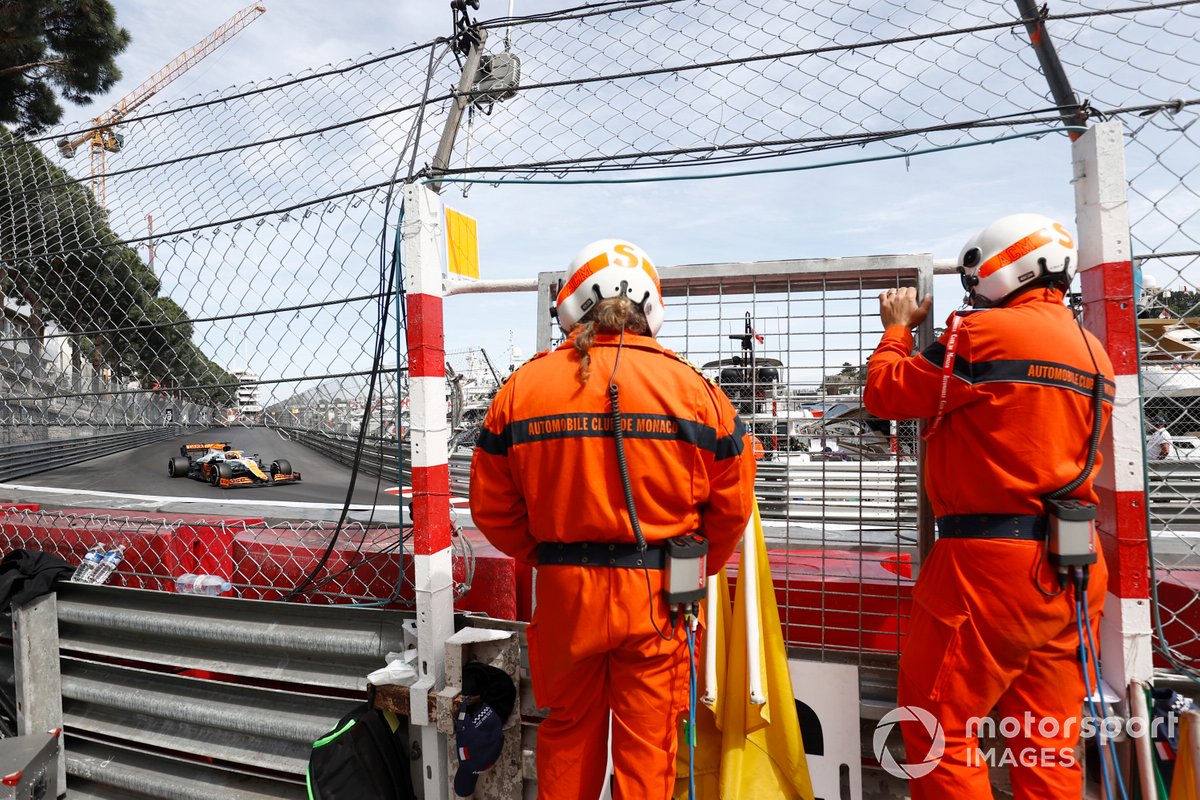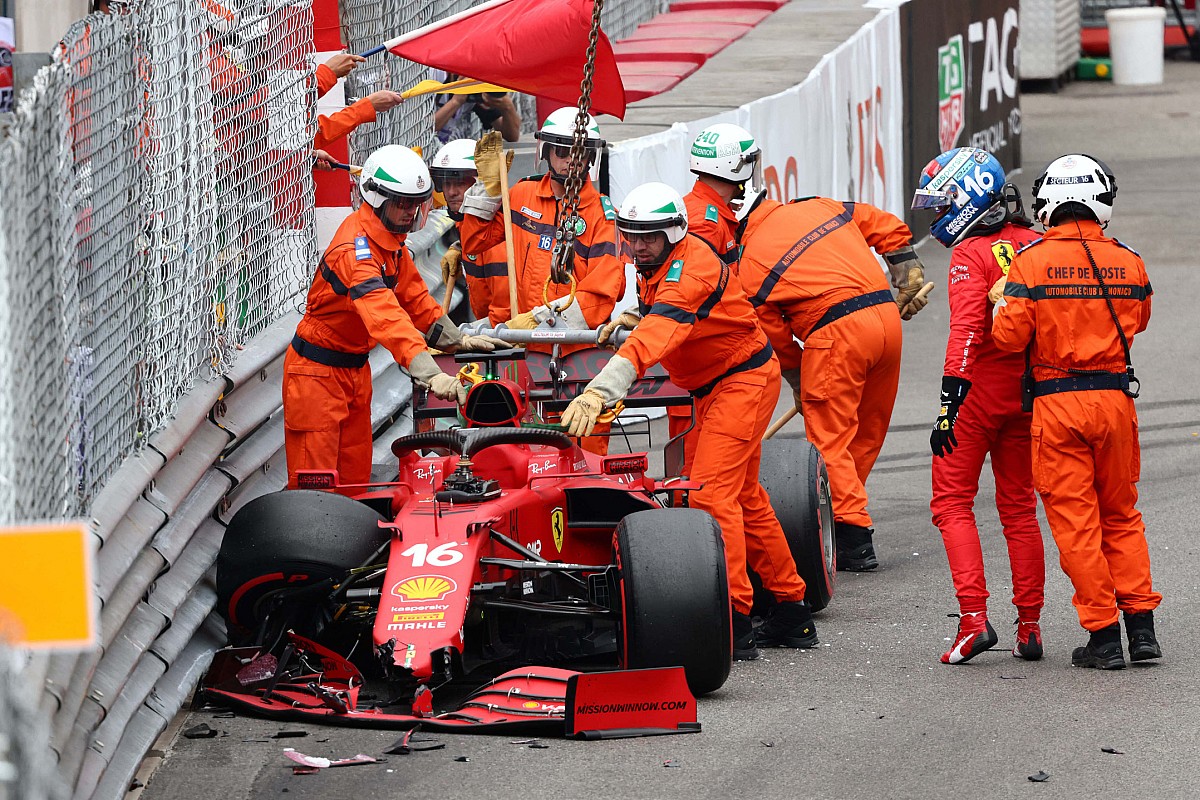But marshals have a much wider remit than just clearing up damaged F1 cars.
They are essential in the successful operation of motorsport in the UK and beyond, performing important tasks while also getting up close to the action.
Here’s a guide to what marshals are and how you can get involved, from a car racing perspective.
What is a marshal?
Marshals play a vital part in allowing motorsport events to take place. Dressed in their unmistakable orange overalls, these volunteers carry out a variety of roles, such as moving damaged cars off the race track, to enable motorsport events to take place successfully and safely.

Marshals watch as Daniel Ricciardo, McLaren MCL35M, passes
Photo by: Andy Hone / Motorsport Images
Who can be a marshal?
Almost anyone can be a marshal. As long as you’re physically fit enough to carry out the duties of a marshal, you can sign up and there’s no upper age limit. Children can get involved too, those aged between 11 and 17 can become a marshal provided they are accompanied by an adult at all times. There are no other restrictions surrounding who can be a marshal.
How do you become a marshal?
The best way to get involved is by signing up to a marshals’ club, such as the British Motorsports Marshals Club. These organisations will be able to provide you with full training to undertake different roles.
A great way to see if marshalling is for you is by taking part in a taster day. These are held at an event and allow you to observe and try out a range of duties marshals perform and gain a better understanding of what it involves.

Marshals clear debris from the circuit
Photo by: Mark Sutton / Motorsport Images
What are the key roles and tasks of the marshals during a race weekend?
There is a huge variety of different roles and tasks that a marshal can carry out, ranging from the obvious duties that can be seen on TV to lesser-known administrative roles. Here are some of the key types of marshal.
- Trackside marshals: These are the marshals that perhaps most obviously spring to mind and can regularly be found on our TV screens. It is their responsibility to help ensure that the track is clear of any potentially hazardous obstacles. This involves recovering damaged or broken down cars and moving them to a place of safety and can also include clearing debris, gravel or oil from the circuit.
- Flag marshals: Another of the more visible types of marshal is a flag marshal, who gives important signals to the drivers on track. This can include warning competitors of a potential hazard, like a spun car, by waving a yellow flag or letting racers know the track is clear again by showing a green flag. The finishline marshal has the additional task of waving the chequered flag at the end of the race.
- Pit marshals: This group of marshals is based in the pitlane and they are called into action during the rare occasions when there is an incident in the pits. This could be a collision between cars entering and leaving their pitboxes or could be tackling a fire when refuelling. Some pit marshals are also equipped with a speed gun to make sure drivers are not exceeding the permitted speed when travelling down the pitlane.
- Startline marshals: These marshals play a significant part before the start of the race, making sure that cars are all correctly lined up on the grid. They then wave a yellow flag if any driver stalls or struggles to get off the line when the race begins.
- Paddock marshals: Marshals aren’t just needed directly around the circuit itself, they can also undertake other roles at the venue. Paddock marshals carry out a variety of tasks including making sure cars are all correctly lined up in the assembly area, before they head out to the grid.
- Administrative marshals: Marshals also carry out a number of behind-the-scenes administrative duties, such as communicating between the marshal post chiefs and the clerk of the course, who is in charge of the race. Just because this group of marshals is less visible, it doesn’t mean they don’t have an important role to play in ensuring race meetings run successfully.
It is not just circuit racing events where marshals are required – they are also vital in a number of other disciplines including rallying, karting and hillclimbs.

Marshals wave the red flag
Photo by: Mark Sutton / Motorsport Images
Do marshals get paid?
Marshals are volunteers and don’t get paid, per se. Given marshals are required to work in all weathers and conditions, this is why it is vital that marshals are passionate about motorsport.
Some organising race clubs offer vouchers, tokens, food or small sums of money to marshals and this varies between different promoters. They may also organise competitions and raffles for prizes like on-track driving experience days.
Why are marshals essential to all motorsport activity?
Without marshals, there would quite simply be no motorsport. The wide-ranging nature of the roles that are performed by marshals make them vital to the successful running of motorsport events and for ensuring that all competitors are safe.

Marshals sweep the track
Photo by: Hasan Bratic / Motorsport Images
How do you become an F1 marshal?
Just like drivers, there are different grades of marshal, which depend on experience and dictate the roles a marshal can complete. For those wishing to work at a Formula 1 event, they must be a minimum of 18 years of age and have been a marshal for at least a year. There is also a stipulation that a marshal must have performed the role they’re applying to carry out for a set number of days in the previous year. Applications are then submitted by clubs and a selection process is conducted – not everyone who applies will be granted a place.
UK marshals do not just have to apply to the British Grand Prix, they can apply to a variety of overseas events – including the Le Mans 24 Hours and F1 races around the world.
Where can I find out more information to become a marshal?
A lot more information about marshals, how to get involved and what they do can be found on the British Motorsports Marshals Club website. There are also links to sign up to taster days to get a better feel for what marshalling is all about.
Further guidance can be found on the website of British motorsport governing body, Motorsport UK.
shares
comments
